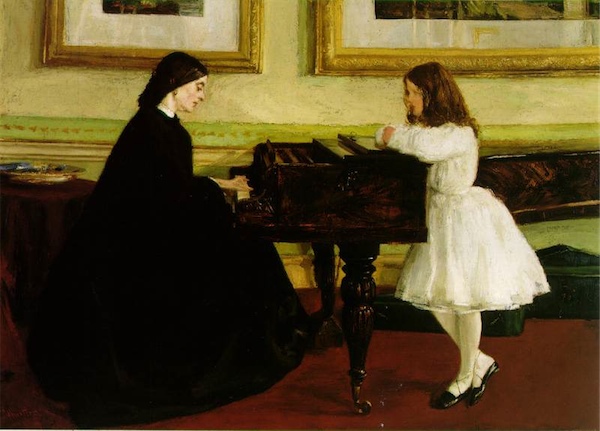
Musik: Atem der Statuen. Vielleicht:
Stille der Bilder. Du Sprache wo Sprachen
enden. Du Zeit
die senkrecht steht auf der Richtung
vergehender Herzen.
Gefühle zu wem? O du der Gefühle
Wandlung in was?— in hörbare Landschaft.
Du Fremde: Musik. Du uns entwachsener
Herzraum. Innigstes unser,
das, uns übersteigend, hinausdrängt,—
heiliger Abschied:
da uns das Innre umsteht
als geübteste Ferne, als andre
Seite der Luft:
rein,
riesig
nicht mehr bewohnbar.
Music. The breathing of statues. Perhaps:
The quiet of images. You, language where
languages end. You, time
standing straight from the direction
of transpiring hearts.
Feelings, for whom? O, you of the feelings
changing into what?— into an audible landscape.
You stranger: music. You chamber of our heart
which has outgrown us. Our inner most self,
transcending, squeezed out,—
holy farewell:
now that the interior surrounds us
the most practiced of distances, as the other
side of the air:
pure,
enormous
no longer habitable.
—Rainer Maria Rilke, An die Musik (Munich, Jan. 11-12, 1918) from Gedichte aus dem Nachlaß in Sämtliche Werke, vol. 2, p. 111 (E. Zinn ed. 1956)(S.H. transl.)
This poem, which might make a good pairing with an earlier poem Rilke wrote called simply Musik, gives us a good sense of the poet’s metaphysical appreciation of music. Rilke was not only a superlative poet, he was also a very serious student of other art forms, as his writing about Rodin and Cézanne demonstrates. But his attitude towards music has puzzled me. References to concerts appear occasionally in his works and his correspondence—hearing a choral work performed in a great cathedral, perhaps, a trip to hear Mozart’s Zauberflöte (which he prefers to follow with his eyes closed, curiously), an afternoon performance of Beethoven’s Missa solemnis, and a limited number of other encounters. But, unlike E.T.A. Hoffmann or Thomas Mann, for instance, his writings reflect very little in the way of a substantive engagement with the literature of music. Only in Die Aufzeichnungen des Malte Laurids Brigge (1910) do we get a more earnest discussion of musical text—it occurs in the course of a portrayal of Ludwig van Beethoven—and there it is the instrumental work that comes through, especially the Hammerklavier. And Rilke sees more evidence in Beethoven’s correspondence—“only in Beethoven’s letters can such consciousness of Music be found,” he writes his publisher, making the case for a popular edition. Still, Rilke’s attention focuses much more on the theoretical role that music can play as a medium of art and communication.
This poem in particular points to his major insight on that point. Rilke was strongly influenced by Islamic concepts of spirituality, and occasionally he contrasts them with Christian equivalents, always to the advantage of Islam. This poem can be unfolded and understood using that approach. The Sufi mystics, like Rumi, incline to see a universe divided between a physical world of immediate perceptions and a spiritual world beyond. Their particular quest focuses on the portals through which a seeker can pass between these worlds, however fleetingly. For Rilke, that is the special function of great art, namely transcendence of the purely physical world and entry into a broader communion of the spiritual that links past and future. These elements are all present in the poem. First, he calls music a “language where languages end,” pointing to the potential universality of music as a medium of communication. And he equates it with a sphere in which the rules of normal physical conduct are suspended—statutes breathe, he writes. (Note that he is also referencing sculpture as an art and pointing to its power to give animate force to the inanimate.) And he points to the suspension of the normal perception of time: time arises out of the direction of hearts transformed, he tells us. Is this not the same message that flows though much of the metaphysical poetry of the Elizabethan age? “Time stands still,” writes John Dowland, for instance. Rilke is identifying music as a portal and also pointing to it as a vehicle for the suspension or extension of time. Those who bring the proper skills to the concert, that is, those who truly understand how to listen, will pass through the portal to another world which will shape and extend their understanding of the universe. But, particularly when we contrast this poem with its predecessor, we see that there is also an aspect of danger, a threat of seduction and misdirection that goes with music. We can think back to examples of classical antiquity in which music may calm frayed nerves and bring peace, but equally can produce insanity or blind passion—music, in other words, can deaden or mute the function of reason which is essential to man’s success in the physical world. This may be called the “dark side” of music, something Thomas Mann charted beautifully in Doktor Faustus.
But if we plot Rilke’s discourse over time, he appears to surmount his fears and stand ready to embrace music for its powerful properties in the end. He sees it as a medium of art inherently more powerful than the art that involves words and thus is bound to a specific language. Music comes to reflect not the threat of an unknown world, but rather the process of maturity, growth and entry into a larger and richer world of perception. It is the medium for dissolution of a barrier between worlds.
Listen to Ludwig van Beethoven’s Sonata no. 29, the “Hammerklavier,” opus 106, in a 1970 performance by Alfred Brendel.


